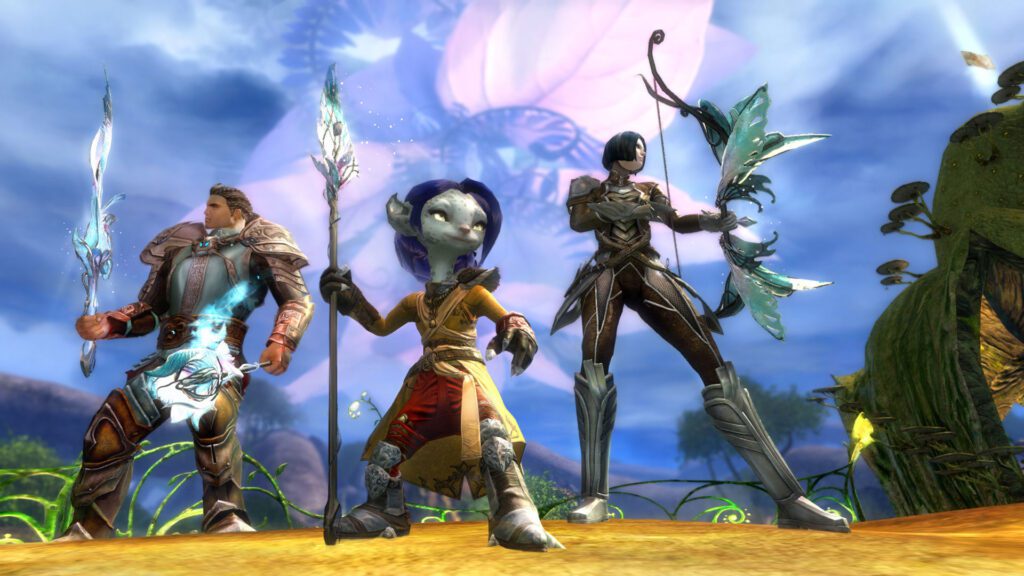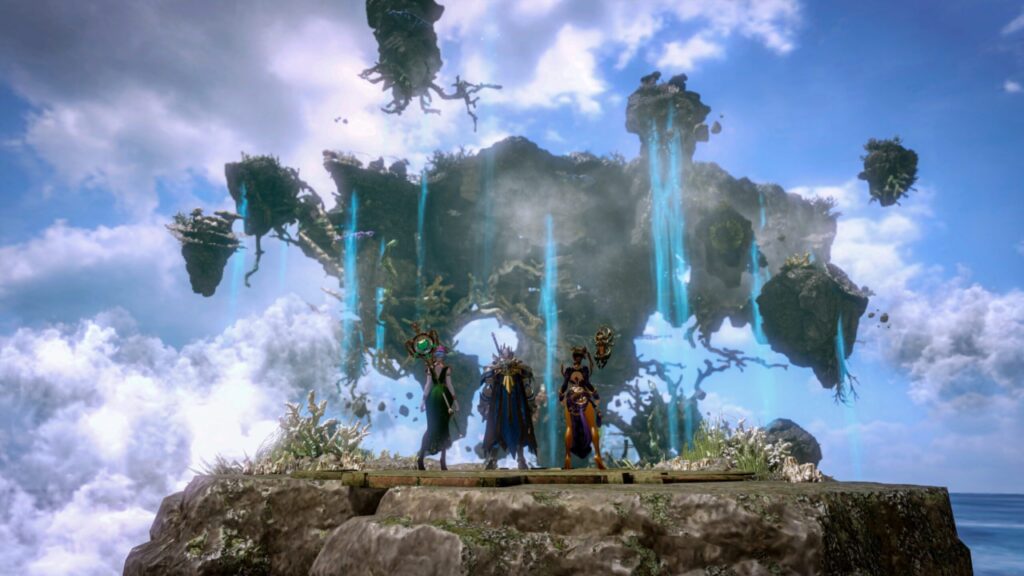In the vast landscape of online gaming, there are games for everyone – from hypercasual mobile games to the hardest console/desktop gaming experiences. However, one of the most loved genres has captured the hearts of millions around the world, and you’ve probably heard its name before. So, do you know what is MMORPG?
In short, this kind of game transports the players to a digital realm filled with content where they play the role of a character, who then embarks on an epic journey through their quests alongside other players.
But what exactly defines an MMORPG? What are their core traits (and why are they so popular among gamers)? What are the most iconic MMORPGs of all time? Well, this is what you’re about to find out in this article!
What is MMORPG?
Massively Multiplayer Online Role Playing Game, or MMORPG for short, is one of the most successful video game genres of all time.
It represents the ultimate amalgamation of an MMO (a game that numerous players can play at the same time) and an RPG (a game in which players can take on the roles of a character in fictional settings), culminating in an expansive virtual universe where thousands of players can interact and collaborate (or battle) in a persistent digital world.
In more ways than we can enumerate, MMORPGs are akin to natural ecosystems: just like they have various species living in the same environment and interacting with one another, MMORPGs usually have different races, factions, and in-universe groups that shape the game’s dynamics.
Players then take on the role of a character that lives in such a world, engaging in various PvE (player-versus-environment) activities to level up, hone their gathering/crafting skills, take on challenging dungeons and raids, join guilds and form alliances, find collectibles, and explore a vast and expansive environment.
Many games also offer an extensive PvP (player-versus-player) system, where they can compete against other players for rewards. Some titles even let different guilds fight for control over a portion of the map, gaining exclusive benefits for triumph on the battlefield.

Main characteristics of an MMORPG (and what makes them so popular)
While every MMORPG is unique in its structure, setting, and player freedom, they tend to share some traits:
- They have a persistent online world: MMORPGs are games that are offered as a live service, so they must be persistent. Set in vast, persistent virtual worlds, MMORPGs might be home to a large number of players who create an interesting and dynamic environment;
- They usually let players roam and explore the world: while not a sandbox game, MMORPGs often have an expansive open world in which players can roam to kill foes, gather materials, complete quests, and much more. Many games even reward the player for taking their time and exploring the world with in-game achievements and even collectibles;
- They possess roleplaying elements: these games allow players to create and customize characters of their own. They can choose their classes, races, factions, skills, and more to further customize their characters. In some titles, some decisions made throughout the main quest might affect the world or lock the player out of potential rewards and quest lines;
- Character progression is a key feature: MMORPGs are very goal-based games, so they exploit it to the maximum to create a robust and satisfying progression system with clearly defined power spikes. This might be implemented in a variety of ways in many of the game’s mechanics, which creates a sense of growth and provides long-term motivation for players;
- There are many quests, missions, and activities: from epic story-driven quests to smaller side quests and random events, MMORPGs are filled to the brim with content to explore and engage with. In turn, they can cater to both casual and hardcore gamers, supporting a variety of different playstyles and appealing to a massive audience with it;
- Their economies are dynamic and ever-changing: players can gather rare ingredients or craft powerful items to trade with other players, fostering a player-driven economy. This adds another layer of complexity to the game, letting gamers specialize in something they enjoy to later exchange their wares with other players;
- They are breeding grounds for social interaction: the “massively multiplayer” aspect refers to the unparalleled ability for players to interact with others within the game. This can happen by socializing with others in virtual hubs, teaming up for quests/dungeons/raids, joining guilds, looking for some sparring sessions, and many more, which fosters a solid sense of community;
- They have regular content updates and expansions: MMORPGs receive regular updates and expansions from the developers, which introduce new content, features, bug fixes, and improvements to the world. They are great at keeping the game fresh, maintaining high player engagement, extending the longevity of the MMORPG, and might even attract new players with the media buzz generated by such announcements.

Most iconic MMORPGs of all time
The gaming market is one of the biggest, and, even within the MMORPG niche, we’re sure to find thousands of games to sieve through. However, only a handful have conquered the hearts of many gamers. Let’s take a quick look at some of them:
- Ultima Online (1997): one of the earliest MMORPGs, Ultima Online embraced the creation of an open world. It also features a player housing system and a player-driven economy, which was so successful it paved the way for many upcoming games;
- Everquest (1999): known for its immersive fantasy world and fiendish raids, Everquest featured a wide assortment of races, classes, and countless quests, attracting a dedicated player base and setting trends for future online worlds;
- Runescape (2001): one of the few successful MMORPGs to offer a browser-based experience, Runescape combines a rich fantasy world, skill-based gameplay, and a robust player community. Nowadays, Old School Runescape (OSRS) and Runescape 3 (RS3) offer two different gaming experiences – the former is more targeted towards hardcore players while the latter is best suited for casual players;
- EVE Online (2003): set in a sci-fi universe in which massive battles spanning days happen, and the political landscape is always changing, EVE Online, which was released more than 20 years ago, is still alive and kicking. Over the years, it has been highly praised for its player-driven in-game politics and economy;
- World of Warcraft (2004): one of the most influential games of all time, World of Warcraft (WoW) invested heavily into worldbuilding, storytelling, beautiful cinematics, and polished gameplay, amassing millions of fans worldwide and generating many related games, like Heroes of the Storm and Hearthstone;
- Star Wars: The Old Republic (2011): set in the universally-acclaimed Star Wars universe, The Old Republic lets players choose between the Sith and the Republic – choices matter! It also comes with an engaging storyline and fully voiced characters, which further enhances the gaming experience;
- Guild Wars 2 (2012): set in the high-fantasy world of Tyria, Guild Wars 2 brings dynamic events and a unique leveling system that highly encourages exploration. The game also offers a unique cooperative MMORPG experience;
- The Elder Scrolls Online (2014): based on the all-time popular Elder Scrolls series, Bethesda’s Elder Scrolls Online lets players explore the vast open environment of Tamriel in all its glory. The character progression system is very flexible and lore has always been one of the game’s strongest selling points;
- Black Desert Online (2014 in South Korea, 2016 worldwide): despite being hailed as one of the grindiest, most pay-to-win MMORPGs to ever exist, BDO features one of the most extensive character customization systems in this list. Adding to the list, its graphics, content islands, life skill systems, countless abilities, and awe-inspiring graphics are nothing short of impressive;
- Lost Ark (2019 in South Korea, 2022 worldwide): last, but not least, comes the MMORPG that managed to combine engaging action RPG combat with usual MMORPG mechanics, making a game whose combat feels snappy and satisfying. The game has multiple classes, a compelling storyline, intense raids that require cooperation, thousands of Mokoko seeds scattered all over the world, and much more!

Exploring the Ever-Evolving Realm of MMORPGs
In the dynamic landscape of online gaming, MMORPGs (Massively Multiplayer Online Role-Playing Games) have emerged as a dominant force, reshaping the video game industry since the early 2000s. Defined by their immersive multiplayer online experience, MMORPGs allow gamers to explore vast virtual worlds, interact with other players in real-time, and engage in captivating gameplay.
One iconic example is “World of Warcraft,” a massively multiplayer online role-playing game that has captivated millions of gamers worldwide since its inception in 2004. With its persistent world, quests, and character customization, WoW exemplifies the quintessential MMORPG experience, drawing players into a fantasy realm where they can embark on epic adventures.
As we move into 2023 and beyond, the MMORPG genre continues to evolve, offering diverse gaming experiences like “EVE Online,” known for its player-driven economy and large-scale space battles, or “Neverwinter,” which seamlessly blends MMORPG elements with Dungeons & Dragons lore. The gaming industry, fueled by MMORPGs and other online multiplayer games, has witnessed a surge in popularity, with titles like “Final Fantasy XIV” pushing the boundaries of graphics, storytelling, and the sheer number of players in a persistent virtual world.
Conclusion
In conclusion, MMORPGs have become a dominant force in the gaming market, alluring players with their vast open worlds, addictive character progression mechanics, immersive gameplay experience, social interactions, cooperative play, and much more.
They offer a unique blend of adventure, fantasy, cooperation (or competition), and endless possibilities, providing a platform for players to go on epic quests, forge alliances, and conquer whatever challenge the developers may throw at them.
As technological advancements happen, consumer hardware gets cheaper, and with mobile phones being everywhere, the demand for compelling MMORPG experiences continues to rise steadily. However, many game developers face the challenge of creating innovative worlds for their games, and this is where working alongside a qualified game studio can make a difference.
With a talented team of over 70 professionals and years of experience in all things game development, we at Main Leaf are well-equipped to brainstorm, refine, and bring your game to life. We have collaborated with multiple companies around the world, providing top-notch game development services – from acting as an outsourcing partner to developing fully-fledged games from the ground up.
Don’t miss the opportunity to create your own virtual world and contact us below to get started on the development of your game!

